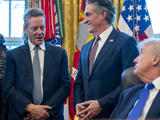A New Chapter in Russian-American Diplomacy: Dialogue at the Highest Level
In the world of geopolitics, high-stakes diplomacy can sometimes be a ballet of shrewd moves and countermoves. This week, attention was drawn to the conversation between President Vladimir Putin of Russia and former U.S. President Donald Trump. As reported by BBC, the tone of the discourse has led some Russian news outlets to herald it as a diplomatic victory for Russia, suggesting a more favorable international standing.
The BBC report pointedly references Russian media’s portrayal of the talks, particularly how Russia perceives Trump's lack of pressure to agree unconditionally to a ceasefire, allowing Putin to leverage negotiations more favorably. Such a strategic narrative is crucial for Russia’s domestic policy, signaling strength and resilience on the international stage, thus bolstering public confidence in the government’s diplomatic capability.
Contrastingly, the People's Daily, from China, maintained a more straightforward stance, highlighting the importance of dialogue to resolve crises and emphasizing the potential contribution such efforts bring towards achieving global peace—a subtle nod towards China's advocacy for dialogue-based conflict resolution as part of its foreign policy ethos.
Meanwhile, Tencent draws attention to an interesting aspect of the diplomatic talks—the agreement aimed at halting attacks on energy infrastructures. Tencent frames this as crucial in setting the stage for a comprehensive ceasefire, reflecting a pragmatic outcome of high-level dialogues amidst ongoing geopolitical tensions.
These discussions have ramifications beyond the immediate issues on the table. They signal a possible thawing of relations, at least on certain fronts, which could promote stability in regions like Eastern Europe. This dynamic plays into broader international relations as countries like Ukraine watch closely to gauge potential shifts in geopolitical support and strategy.
Yet, this geopolitical dance occurs against the backdrop of a complex multipolar world order. As Russia seeks to assert its influence, the United States, under current leadership, may require recalibrating its approach to diplomacy and global initiatives, mindful of not alienating allies while engaging with rivals.
What emerges vividly from these layered perspectives is a narrative of significant diplomacy marked by strategic postures. Each article underscores different facets of the same event. BBC with a focus on political wins, People's Daily prioritizing peace dialogue, and Tencent emphasizing on practical outcomes. Such multi-angular reporting enriches the global audience's understanding of diplomatic moves as part of a much grander geopolitical narrative being woven every day.


